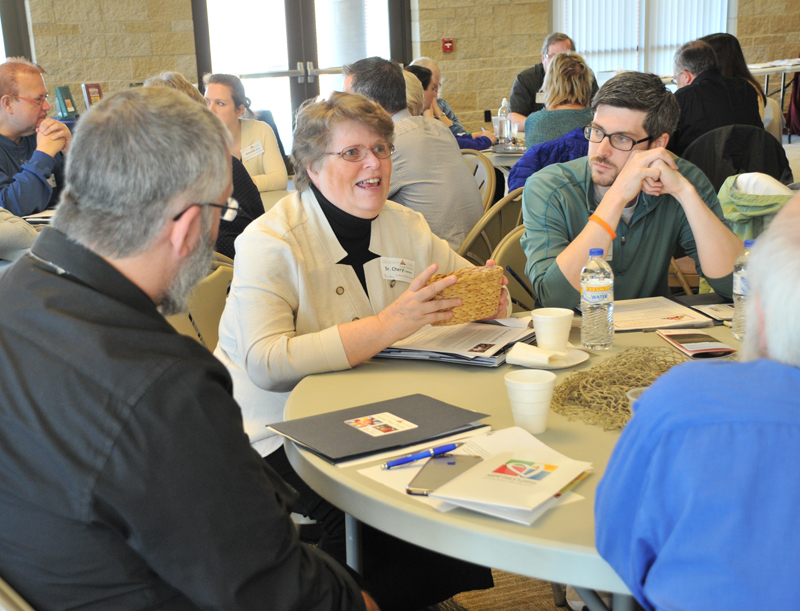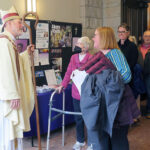By Lindsay Steele
The Catholic Messenger
IOWA CITY — During a workshop for adult youth ministry leaders, speaker Tom East compared youths to dogs chasing a rabbit. The dogs that saw the rabbit will continue to pursue it, even through obstacles, while the dogs that joined “just for the barking” are more likely to drop out.

Making a connection between the rabbit and God, he said youths “need to experience a relationship with Christ. If they haven’t seen it, they won’t stick around.” Adults can play a huge role in helping youths to feel a powerful connection to God that will help form them into missionary disciples for life, said East, the director of the Center for Ministry Development.
Missionary discipleship, in the words of Pope Francis, is a means of being Christ in the world by healing, sharing the Good News and witnessing to the faith in a way that combines lives of service and faithfulness with evangelization.
East identified four key elements of forming missionary disciples. First, they must encounter Christ. Adults can help accompany youths on this journey by giving them opportunities to experience Christ and to see how he has worked in the lives of others. Youth ministers should not be afraid to share their own stories. Second, youths should experience faith in a community setting that deepens a relationship with Christ. Third, youths should be active in faith practices such as attending Mass. Fourth, youths can be energized through reaching out to others.
East also talked about trends pertaining to youths who stick with the faith into adulthood. They seem to be trending toward a preference for small groups and a variety of activities versus a one-size-fits-all approach. He was adamant that youth ministry leaders don’t need to wear themselves thin in the process; they should seek out adults to lead new activities and serve as mentors.
Youths who had supportive parents or other adult mentors have a much higher probability of being engaged in the faith into adulthood. East said adults should endeavor to accompany youths on their journey, and not just tell them what they should be doing.
He noted that older adolescents in faith formation who are at a more advanced level spiritually are at risk of losing interest if they are not given additional opportunities to nurture their faith. Sharon Crall of St. Mary Parish in Albia asked how a youth minister should go about singling out students without alienating other members of the group. “Don’t restrict, but do personally invite,” East said.
Workshop participants engaged in several idea-sharing activities. They wrote faith formation ideas on brightly colored pieces of paper and stuck them to the wall. Later, the participants swarmed around the paper mosaic and took photographs, hoping to take home some new ideas. The participants also broke into groups and “created” a youth, mapping out his or her qualities and designing a personalized ministry plan.
Don Boucher, director of the diocesan Office of Faith Formation, introduced a new staff member at the workshop. Rosina Hendrickson serves as the Diocese of Davenport’s lifelong faith and ministry formation coordinator. Participants were also introduced to her cooking, as she served lunch at the workshop. “(Ministry formation) is my joy and passion. My second is cooking,” she quipped. “I look forward to getting to know you individually, and get to know your parishes. This is not ‘top down,’ but a partnership in spreading the faith in our communities.”
Boucher said he was thrilled with the turnout of about 80 ministry leaders and clergy. “I know how hard it is to get away,” he told the group. “We appreciate what you do, day in, day out, in the trenches with the young people in your parishes.”\Adolescent faith formation survey update
Adolescent faith formation survey update
The Diocese of Davenport Faith Formation Office released the results of the “Re-visioning Adolescent Faith Formation” survey during the youth ministry workshop on May 4.
The results reflected the opinions of three distinct but interrelated groups: pastoral leaders, adult ministry leaders, and sixth-through-12th-grade adolescents.
Don Boucher, director of the Faith Formation office, noted that 595 youths have responded so far, along with 31 pastoral leaders and 50 adult leaders.
The assessment was intended to be a starting point at the beginning of a journey to better minister to adolescents in the diocese. Boucher said surveys are continuing to be accepted. A detailed analysis of the survey will be available in an upcoming edition of The Catholic Messenger.











